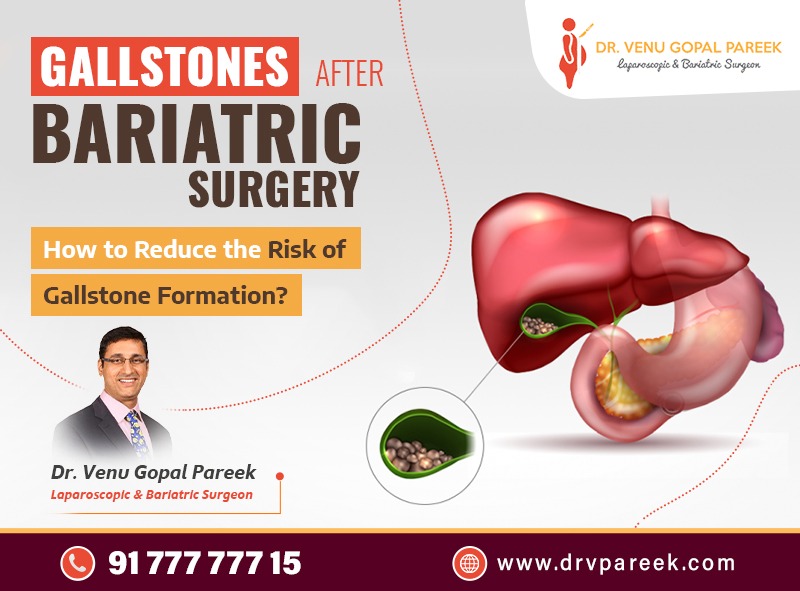
Gallstones after Bariatric Surgery – How to reduce the risk of Gallstone formation?
Side effects after undergoing major surgeries are common and developing gallstones after bariatric surgery is one of the side effects in some people. However, it can be managed if proper care is taken. In rare cases, if the severity of the problem increases, the gallbladder might need to be removed.
Gallstones
Gallstones are hard, pebble-like deposits that form in the gallbladder or other parts of the biliary tract. They are made up of cholesterol, bile salts, and other substances found in bile. Gallstones can be any size, from the size of a sand grain to that of a golf ball. They can cause pain, nausea, vomiting, and other symptoms. In some cases, they can block the bile ducts and lead to infection, inflammation, or even pancreatitis. Treatment usually involves medications to dissolve the stones or surgical removal of the gallbladder.
Rapid weight loss following bariatric surgery and an alteration in bile acid circulation are the primary causes to form gallstones. In most cases, problems with gallstones begin within two years following the bariatric surgery. After that, the likelihood of gallstone development decreases and becomes the same as that of the general population.
How can you reduce the risk of developing gallstones after bariatric surgery?
The risk of gallstone development can be managed by taking timely medicines and following a proper diet. Ursodeoxycholic or Ursodiol acid is one of the most frequently used medications, and it is available in most pharmacies with a prescription. If you use medicines like these as prescribed by your doctor over a period of time post-surgery, it can reduce the chance of developing gallstones (a small, hard crystalline mass) in the gallbladder.
A study published in 2013 found that gallstones occur in approximately 100 out of 1,000 patients who have undergone bariatric surgery. Usually, the medication to treat gallstones is especially used during the rapid weight loss period after surgery. Most of the gallstones are cholesterol stones, which account for about 80% of all gallstones.
If the amount of cholesterol produced by your liver exceeds the capacity of your bile to breakdown it, the extra cholesterol may crystallise and finally solidify into stones and may settle in your gall bladder. So avoid high cholesterol diet and include a high-fibre diet in your daily routine following surgery to reduce the risk of the development of gallstones.
For more information and guidance from experts regarding bariatric or medication to refrain gallstones, meet Dr. Venugopal Pareek, one of the best bariatric surgeons in Hyderabad.
Below are some of the important tips that help reduce the incidence of developing gallstones.
Maintain a balanced and healthy diet: Eating a balanced and healthy diet that is high in fibre and low in fat can help reduce the risk of developing gallstones. Consume nuts and almonds, high-fibre carbohydrates such as whole grains, vegetables, berries and fruits, fish etc.
Never skip your meals.
Exercise regularly: Regular exercise can help you to maintain a healthy weight and reduce the risk of developing gallstones.
Drink plenty of fluids: Drinking plenty of fluids helps to keep the body hydrated and can reduce the risk of developing gallstones.
Take supplements: Taking supplements such as choline, omega-3 fatty acids, and vitamin C can help reduce the risk of gallstones.
Talk to your doctor: If you are considering bariatric surgery, it is important to talk to your doctor about the risks involved and how to lower them.
Hope this blog has been helpful in providing insight into gallstone formation following weight loss surgery and how it can be managed for your better health and well-being. At the end of the day, it’s important to remember that communication between you and your doctor is key to getting the best care possible. Don’t be afraid to ask questions and bring up concerns. Dr. V Pareek, a laparoscopic and Bariatric Surgeon in Hyderabad is here to help you feel better and make sure that you get the best care possible. Thank you for taking the time to read this blog and we wish you the best of health.







